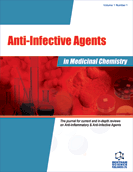Abstract
The mounting incidences of drug resistance of the unicellular eukaryotes along with insecticide- resistant vectors are the foremost factors contributing towards the amplified prevalence of tropical diseases in underdeveloped and developing countries. Malaria and leishmaniasis are two most significant parasitic diseases endemic in these regions and result in high rates of mortality and pose an additional socio- economic burden. Being short of effective immunoprophylaxis; relevant preventive sanitary measures and pharmacological approaches are needed to empower the undesirable effects of these diseases. Current antiparasitic chemotherapy is expensive, has undesirable side effects, or is marginally effective due to the problem of resistance. Collaboration of molecular biology and drug discovery approaches are required, which could lead to identification of new drug targets for efficient chemotherapeutic intervention. The recent trend in identification of drugable targets has provided a new leap in the study of the structural determinants which could be effectively targeted. The present review highlights the various chemotherapies available in the area of malaria and leishmaniasis and novel metabolic and enzymatic pathways which are being pursued for new drug discovery endeavors.
Keywords: Malaria, Leishmaniasis, parasitic diseases, Chemotherapy, Drug Discovery, unicellular eukaryotes
 8
8





















